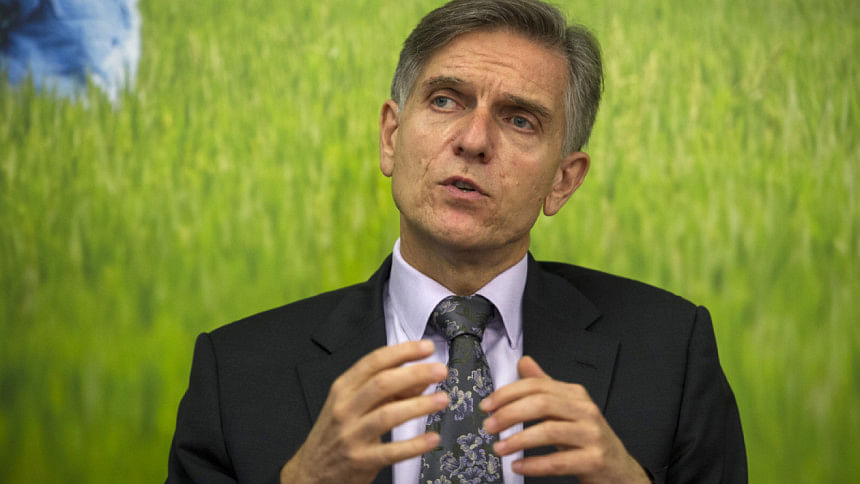Blend technology with farming for optimal yield

BANGLADESH will have to enhance farm productivity by blending modern technologies, hybrid seeds and world-class crop protection solutions in the face of depleting farmlands and rising population, an expert said.
Davor Pisk, chief operating officer of Syngenta International AG, the world's largest agrochemical company, said, “Growers across the world are facing this challenge of enhancing productivity, and we all need to shift to advanced technology and scientific agronomic practices.”
“In Bangladesh, agriculture essentially has a fundamental need to become much more productive and sustainable in the years ahead,” he told The Daily Star in an interview recently in Dhaka.
Bangladesh has tripled its rice production since its independence, from 10 million tonnes in 1971 to over 32 million tonnes in 2014. Bangladesh is now the world's sixth largest producer of rice, which accounts for 77 percent of agricultural land use.
The supply of rice is likely to grow to 39 million tonnes by 2030. It is projected that Bangladesh will be able to supply its own cereal grain till 2020.
Pisk said modern varieties have been introduced on 75 percent of the total rice cropped area.
“These trends are highly encouraging,” he said, noting that the agriculture sector characterised by small, rice-dominated farms have greatly contributed to increasing food self-sufficiency over the last 30 years.
However the challenges are glaring for Bangladesh as well, in view of the growing population and their increasing requirements, according to the Croatia-born British national.
“I have reasons to believe that the country will continue to script good success and adoption of technology, high-end solutions and enhanced agronomic practices will further add to the growth potential. And yes, there is merit in continuously expanding extension services to ensure farmers remain on top of the learning curve.”
Swiss-based Syngenta is a leading agriculture company helping improve global food security by enabling millions of farmers to make better use of available resources through the company's innovative crop solutions.
“We are committed to rescuing land from degradation, enhancing biodiversity and revitalising rural communities. A focus on agricultural sustainability has always been fundamental to what Syngenta does.”
Pisk, who completed his master's in political science from the University of California, but chose to pursue a career in agriculture chemicals, said the company is working extensively on solutions that provide productivity enhancements of up to 30 percent in important crops such as rice, corn and vegetables just by following simple crop protection protocols and applying inputs at the right stages of the crop cycle.
One of our integrated crop solutions for rice, GroMore, is consistently attaining more than 20 percent greater yield for rice farmers, he said.
“This is significant for a country like Bangladesh where rice is the staple food.”
With a population of more than 160 million, Bangladesh requires a robust, modernised agriculture sector to ensure food security, Pisk said. The scope to increase cultivable land is limited.
“To meet the food grain requirements of the nation, agricultural productivity and its growth has to be sustained and improved. Judicious use of agrochemicals is very important for the sustained growth of the Bangladesh agriculture and economy.”
“Plus we need all available agricultural technologies, including biotechnology, to meet the current and projected demand for food, feed, fibre and biofuel. GM (genetically modified) is one tool in a range of options that can help produce enough food for a growing world population.”
He said it is important to look at biotechnology in the context of climate change.
Pisk said he is particularly happy to note that Bangladesh has realised the potential of biotechnology.
State-run Bangladesh Agricultural Research Institute has released four BtBrinjal varieties since October 2013. Another three are likely to be released this year.
“Things are on track for the development of biology-driven technology to meet future requirements. Agricultural biotechnology can improve productivity, secure yields and improve the quality of crops, while minimising the impact on the environment,” he said.
“If Bangladesh is to feed its growing population, GM and other technology options should be available to farmers.”
Pisk said a rule of thumb for profit in farming is to reduce the production cost and get more yield out of the same land.
“Building on the combined strength of our crop protection and seeds businesses and with our unique approach of 'thinking like a grower', we are embracing the farmer with one voice and one face, to deliver end-to-end solutions for key crops such as corn, wheat, rice, vegetables and cotton. Our integrated crop solutions for these crops ensure increased yield and quality of the produce giving better profitability margins to the growers.”
In addition to technology and agronomy, there will always be need for enhancing better market linkages for farmers, improving access to institutionalised loans, providing extension services, and including crop rotation to ensure farmers get adequate returns on their investments.”
Pisk came to Bangladesh on a three-day tour, three days after Syngenta announced state-run China National Chemical Corporation's offer of $43 billion to acquire the Swiss pesticide and seed giant.
It is widely believed that ChemChina's buying Syngenta would enable further expansion of the company's presence in emerging markets, particularly in China and the rest of Asia.
Under the deal, Syngenta will retain its name, management, its broad portfolio and geographic presence, and remain headquartered in Switzerland.
Pisk said ChemChina's offer to acquire Syngenta is unanimously backed by the board of the Swiss company. The transaction could be concluded by the end of this year, subject to shareholder acceptance and regulatory approvals.
“While we are very excited about the many opportunities this combination is expected to create, it will still be business as usual for our customers, business partners, employees, shareholders and the communities we serve.”
He said the deal will give the company a stable shareholders' base having long-term commitments. “We'll try to reach out to more smallhold farmers across emerging markets.”
Pisk also pointed out a potential danger. He said the world is reaching a situation where it is becoming difficult to motivate the existing farmers to continue farming and it will only get more difficult in the future.
“If we do not equip growers with required technologies to break away from the cycle of El Nino, floods and droughts, the situation may even become worse. So, there lies tremendous opportunity for the private sector and the public sector to come together and leverage the advancement in research and development and good agronomy practices coupled with integrated crop solutions.”
Syngenta has set up technical evaluation farms for both seeds and chemical products in Bogra and is looking for opportunities to explore further advancement in the near future.
“We are very committed to expanding our presence in the country and we think that with our new technology and products, we can make a very real difference to the size and quality of our business.”

 For all latest news, follow The Daily Star's Google News channel.
For all latest news, follow The Daily Star's Google News channel. 



Comments